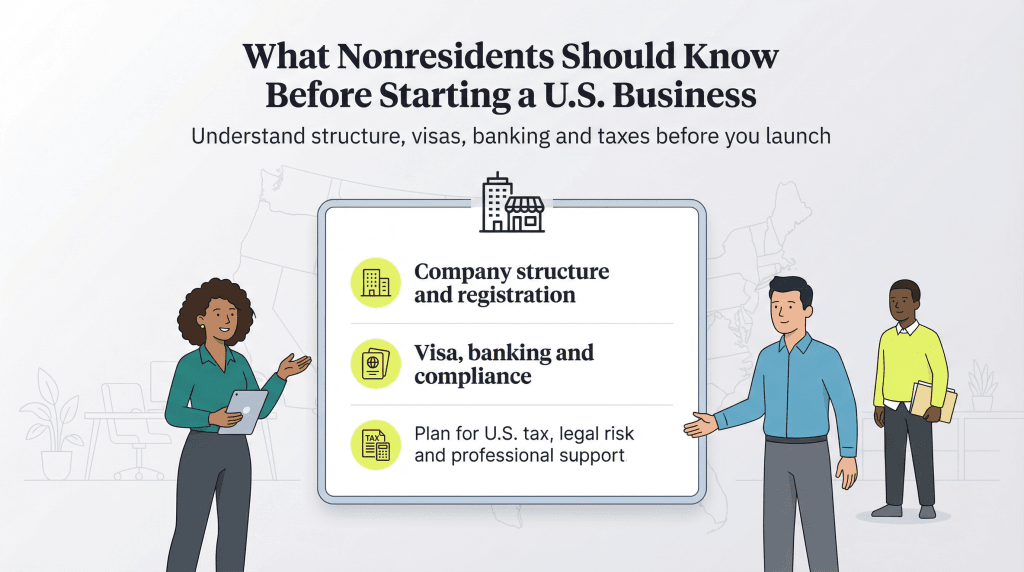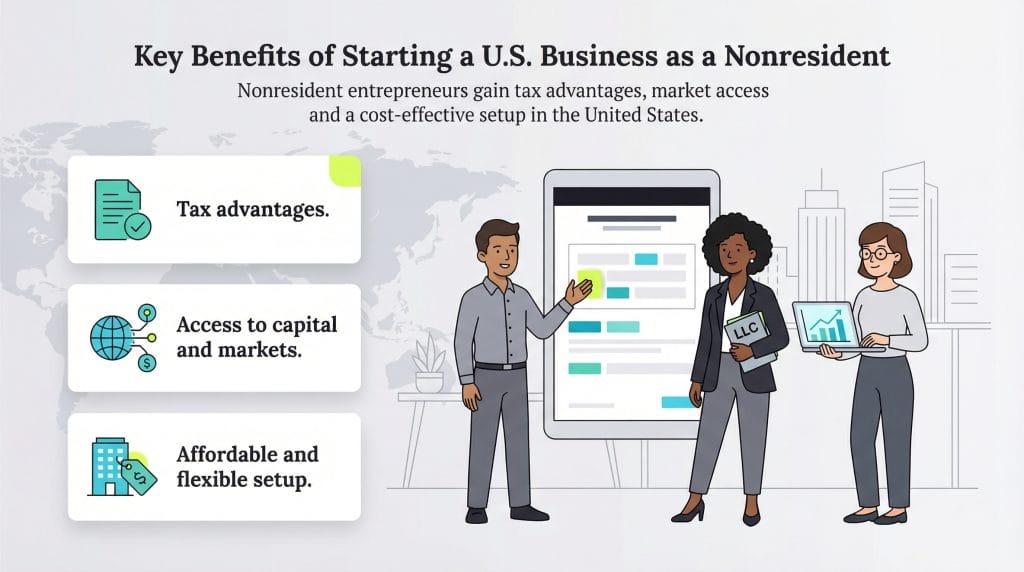The United States is an attractive place to start a business thanks to its global influence, business-friendly infrastructure and strong culture of innovation. For aspiring entrepreneurs who don’t live in the U.S., there’s good news: You don’t need to become an American citizen — a process that’s often long and complicated — to form a company in the U.S.
Not only is it possible to set up, maintain and own a U.S. business while residing in another country, but it is also affordable. However, there are some logistical and legal considerations to keep in mind. This guide explores how foreigners can participate in the world’s largest economy.
What nonresidents should consider when starting a business in the U.S.
Although nonresidents are expected to undergo the same process as those living in the U.S. when forming a business, there are conditions and limitations specific to foreigners. Darrel White, partner at Kimura London & White LLP, recommended that aspiring entrepreneurs consider their business objectives and how they fit into U.S. legal and tax frameworks. “Will [you] conduct business in the U.S. with a physical presence or simply trade from foreign soil?” he said. “Will [you] require a visa? Do [you] possess U.S. partners or clients? Such questions establish the proper entity, tax arrangement and compliance methodologies.”
Here are some key areas to consider when opening a company in the U.S.
1. Company structure
The U.S. offers different ways to structure a company for nonresidents:
- Limited liability company (LLC). An LLC is a formal legal structure that separates personal assets from company debts. Its primary benefit is protecting business owners from liability during litigation. Under an LLC, business owners are not required to use personal assets to cover company debts. Typically, small businesses favor LLCs for this and other reasons.
- Partnership or limited liability partnership (LLP). An LLP is a formal legal structure that includes a partnership agreement outlining responsibilities and liabilities. The difference between an LLP and an LLC is the designation of a managing partner who is liable for the partnership’s actions. Business owners typically favor LLPs when there is more than one business partner.
- C Corporation (C-corp). A C-corp is a formal legal structure that clearly defines taxation, governance and compliance rules. Typically, C-corps are used for large businesses seeking venture capital. [Learn the difference between private equity and venture capital.]
The two most commonly used structures are corporations and LLCs, as both shield owners from direct liability for business operations, according to Hans Kaeser, partner at CM Law PLLC. However, the right structure for your business will depend on your goals and needs — including how you plan to obtain funding. “Venture investors frequently prefer their investments to go into a corporation,” Kaeser added.
There are many types of business structures and corporations, but nonresidents can only create a select few.
2. Visa requirements and restrictions
According to Shane Lucado, Esq., founder and CEO of InPerSuit Inc., some nonresidents incorrectly assume that owning a U.S.-based company automatically grants them a visa or work authorization. However, “ownership and immigration status operate on separate tracks,” so, nonresident entrepreneurs must pursue a visa or employment pathway — whether temporary or permanent — depending on their role in the company, their level of investment and long-term plans.
One option is the EB-5 Immigrant Investor status, in which a nonresident must invest $1,050,000 in a new business enterprise (lowered to $800,000 in targeted employment areas or public infrastructure projects) while creating at least 10 full-time employment positions. Another is the International Entrepreneur Rule, allowing temporary parole for startup founders with substantial ownership and a central role in their company. Each of these comes with specific eligibility criteria and conditions, so you’ll want to conduct thorough research to avoid issues down the line.
“One of the most common immigration mistakes is not understanding the specific requirements and restrictions of your visa as it relates to employment and starting a business,” said Marina Shepelsky, Esq., founder and CEO of Law Offices of Marina Shepelsky, P.C. “If you have questions, ask a lawyer.”
3. Business registration
U.S. companies are incorporated at the state level instead of the federal level ― and some states offer benefits for your business. “Delaware offers structural flexibility and mature legal precedent, which matters if the company plans to seek U.S. investment or deal with larger contractors,” Lucado noted. “Wyoming is … [known] for privacy and lower cost, [while] Florida and Texas attract founders focused on physical product or logistics through U.S. ports.”
However, your state of registration should match your operational location and funding plans: “Filing in Delaware while doing business from California without registration triggers penalties,” Lucado said.
No matter which state you choose, you can register your U.S. company online. Online business formation specialists can function as your registered agent to facilitate the process.
4. Bank accounts
While an employer identification number (EIN) is not a requirement during the business registration phase, you’ll need one to open a bank account, secure a business license, obtain loans, hire employees and pay taxes. What may surprise entrepreneurs is that opening a business bank account can be surprisingly difficult for nonresidents.
“Opening a U.S. business bank account has become increasingly difficult for foreign-controlled entities,” explained Daniel Badovinac, partner at Berger Singerman. “Due to strict anti-money laundering (AML) and Know Your Customer (KYC) regulations, many banks require an in-person visit, a U.S.-based director or proof of local operations.”
There are several ways to satisfy such requirements:
- Get a visitor visa, travel to the U.S., go to your bank of choice and open an account personally.
- Go to a U.S. bank with a local branch in your country of origin for identity verification, if their policies allow such an arrangement.
- Use third-party services to help you set up an account.
According to Sang Shin, partner at Jackson Walker, LLP, it can take time for an EIN to be issued — which can subsequently delay a nonresident’s ability to open a business bank account.
5. Tax requirements
Running a business in the U.S. comes with specific, often complex, tax requirements. For example, though nonresidents can run a U.S. business remotely, the company does require a U.S.-based presence to remain in compliance. This requires a registered agent, and in many cases, a U.S.-based mailing address. “If no registered agent is appointed — a legal requirement that will cost $100 to $300 annually to maintain — the business owner will fail to file on time and incur fines … ,” said Seann Malloy, founder and managing partner at Malloy Law Offices. “I suggest getting a virtual office in the U.S. and a registered agent to keep you compliant.”
In Malloy’s experience, nonresident entrepreneurs are often “blindsided” by U.S. tax obligations tied to their U.S.-based income. “For example, a seller using Amazon FBA [Fulfillment by Amazon] for e-commerce may owe sales tax in states where inventory is stored, even without having a physical office,” he added. “My advice: budget for a tax professional to help navigate nexus rules.”
6. Legal landscape considerations
Shin recommended that nonresidents be aware of the “litigious nature” of the U.S. and the subsequent importance of contracts and case law. “Key considerations include legal structure/entity formation, regulatory compliance, tax, intellectual property protection, employment and immigration, data privacy/security, insurance and other compliance issues to ensure a smooth market entry,” advised Shin.
When in doubt, consult with a legal professional — as Kaeser noted, a lack of knowledge or experience is not considered a sufficient defense against noncompliance in the U.S. “The principle of ‘caveat emptor’ [Latin for ‘let the buyer beware’] is deeply ingrained in U.S. business culture,” warned Kaeser. “The laws do not protect the unwary to the same extent they do in many other jurisdictions.”
What are the benefits of starting a business in the U.S. as a nonresident?
Starting a business in the U.S. can take time and planning, but it’s worth the effort for many employers. Here are just a few benefits:
Tax benefits
Every business should consider taxes. The U.S. tax system is favorable to businesses and offers many different legal structures to award tax benefits while sheltering entrepreneurs from personal liability. The U.S. Department of the Treasury offers many tax programs for businesses as well ― especially small businesses.
The U.S. government actively provides tax benefits for businesses. One example was during the COVID-19 pandemic when the U.S. government passed the American Rescue Plan Act, which provided tax credits to help keep employees paid and offer paid leave. These are signs that the U.S. is welcoming to businesses, including entrepreneurs from all over the world.
Staying informed on the latest tax credits offered by the U.S. Department of the Treasury can save your business a lot of money over time. Consider
hiring a certified public accountant (CPA) to navigate the tax system.
Access to U.S. market and capital
The U.S. offers a diverse and wealthy selection of some of the most respected venture capitalists in the world. When you start a business in the U.S., you inevitably gain access to this deep-pocketed investment sector. For this reason, tech startups from around the globe set up businesses in America.
Reputation
The U.S. prides itself on having a highly developed market economy. This reputation is an asset to businesses operating globally. American businesses are respected on the world stage. Branding is vital when operating a business and the American economic brand is strong.
Affordable setup and maintenance
Starting a business in the U.S. comes with low setup fees and convenient remote processes. Individual setup fees depend on the state in which the business starts. For example, the cheapest foreign LLC registration in the U.S. is in Hawaii, Michigan and Missouri for as low as $50 while the most expensive is in Texas or South Dakota for $750. Even the most expensive state is considerably cheaper than other countries ― especially when you consider the unwritten costs attached to operating a business in some places.
Dissolving a business is also relatively straightforward and affordable in the U.S. — some states don’t even require a fee to do so — though exact requirements vary by state. Additionally, maintaining a business in the U.S. requires only annual reporting and corresponding fees; there’s no need for an annual CPA audit, though certain situations (such as securing financing) may require audited statements.
Ultimately, creating a business in the U.S. has a lot of benefits with fairly minimal downsides. The country offers many resources for foreign investors and entrepreneurs while maintaining a business-friendly environment.
Sean Peek contributed to the reporting and writing in this article.














